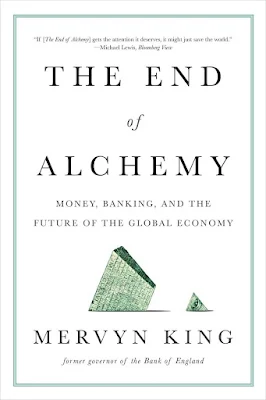
Mervyn King's End of Alchemy: Unveiling the Alchemy, Root Causes, and Future of Money and Banking.
Deep Dive into the Book's Core Ideas and Solutions
In his groundbreaking book, "The End of Alchemy," former Bank of England Governor Mervyn King delves into the intricacies of money and banking, offering a refreshing perspective on their past, present, and future. Stepping beyond the surface-level analyses that dominated post-2008 discourse, King tackles the fundamental issues plaguing the global economy and proposes practical solutions for a more resilient and prosperous future.
Unlocking the Secrets of Financial Alchemy
At the heart of the book lies the concept of financial alchemy, where seemingly magical forces create immense financial powers. King traces this phenomenon back to two foundational ideas: paper money and credit-issuing banks. While these innovations fueled the Industrial Revolution and scientific advancements, they also sowed the seeds of inflation, instability, and bank failures, culminating in the 2008 crisis.
Navigating Uncertainty and Disequilibrium
King acknowledges the inherent uncertainty of our world, emphasizing the limitations of expert predictions and economic models. He criticizes the overreliance on unsustainable fiscal and monetary policies, arguing that they fail to address the deep-rooted imbalances in the global economy. These imbalances, manifested as trade surpluses in certain nations and deficits in others, have pushed real interest rates below their equilibrium levels.
Reimagining the Global Monetary System: A Two-Pronged Approach
To remedy this imbalance, King proposes a paradigm shift in the global monetary system. His two-pronged approach advocates for:
- Harmonization of Inflation Targets: Nations should adopt a unified inflation indicator based on global price movements, fostering greater stability and coordination.
- Exchange Rate Adjustments: Countries should adjust their exchange rates to achieve balanced output and spending, correcting distortions and promoting fair competition.
Helicopter Money: A Radical Yet Viable Solution?
Adding another layer to the discussion, King introduces the controversial concept of helicopter money. This involves direct money distribution to citizens or governments, bypassing traditional bank lending channels. While unconventional, the idea sparks debate about its potential to stimulate the economy and address inequality.
Rethinking Banking: Building Stability and Resilience
Another central theme revolves around the inherent instability of banks. King argues that their ability to transform risky long-term loans into secure short-term deposits creates a mismatch in maturity and liquidity, exposing them to potential crises. Additionally, he examines how bank lending, while fueling economic growth, also contributes to systemic risk.
Banking Reform: Two Pillars for a Safer Future
To ensure a more robust and resilient banking system, King proposes a two-pillar reform:
- Enhanced Capital Requirements: Banks should hold significantly higher equity capital relative to their assets, providing a stronger buffer against losses.
- PFAS Bonds: A Safety Net for All Seasons: Implementing "pawnbroker for all seasons" (PFAS) bonds would automatically convert them into equity if a bank's capital fell below a threshold, protecting depositors and taxpayers.
Beyond Fiscal and Monetary Policy: A "Penny in the Fuse Box" Approach
Finally, King advocates for a proactive monetary policy tool called the "penny in the fuse box" approach. By gradually raising interest rates in anticipation of economic overheating, central banks can curb excessive credit expansion and prevent the formation of asset price bubbles.
A Thought-Provoking Vision for the Future
"The End of Alchemy" is a must-read for anyone seeking to understand the complexities of money and banking in today's world. King's unique perspective and practical solutions provide a valuable roadmap for navigating the uncertainty ahead and building a more balanced, sustainable, and prosperous global economy.
FAQ
Mervyn King argues that much of what has been written since the financial crash addresses the symptoms and not the underlying causes. He believes that the correct lessons have not been learned, and the disequilibrium that built up in the twenty years prior to the crisis (the Great Stability, as he calls this period) is yet to be addressed.
King states that economists “have brought the problem upon themselves by pretending that they can forecast”. He expands later that many of the large shifts in macroeconomic variables are determined ultimately by unobservable and unpredictable events.
King's advice to the economics community is to accept that we live in a world of radical uncertainty, where there are multiple and unquantifiable outcomes. He suggests that it is not irrational for individuals and households to use coping strategies or heuristics to deal with these uncertainties.
The book addresses two major concerns; the state of the world as it stands, and the role of the banking sector to be able to weather shocks better than it has in the past.
King draws on his unique experience to present fresh interpretations of these economic forces and to point the way forward for the global economy. His bold solutions cut through current overstuffed and needlessly complex legislation to provide a clear path to durable prosperity and the end of overreliance on the alchemy of our financial ancestors.
You can get this book on Amazon:
